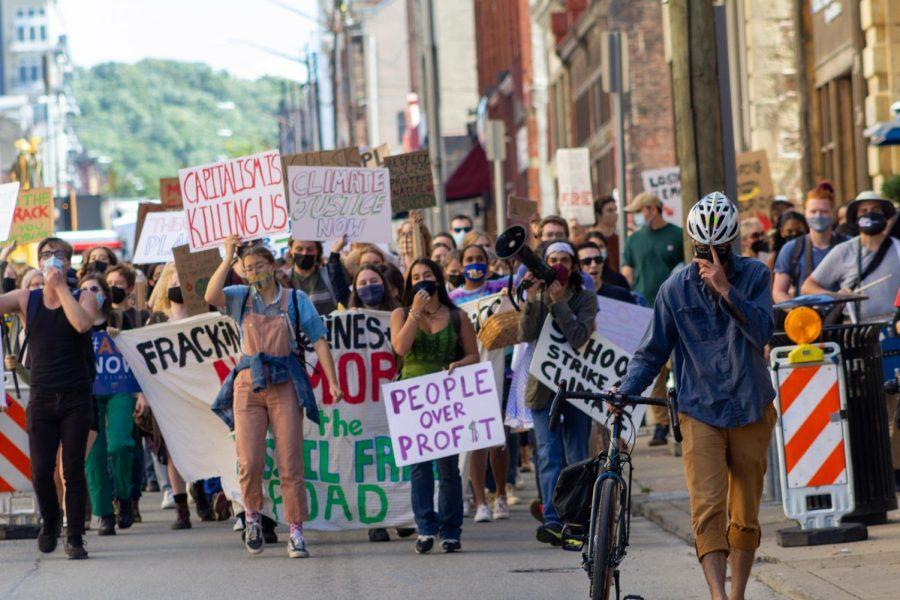Climate strike marches for climate justice, youth representation in local climate decisions
John Blair | Senior Staff Photographer
Sunrise Movement Pittsburgh hosted the Pittsburgh Climate Strike on Friday to fight for three demands — represent youth in local climate decisions, ban fracking and tax big businesses in order to create more green infrastructure.
September 27, 2021
More than 200 protestors marched down Fifth Avenue on Friday demanding climate justice. The protesters chanted, “No coal, no oil, keep your carbon in the soil!”
Sunrise Movement Pittsburgh hosted the Pittsburgh Climate Strike on Friday to fight for three demands — represent youth in local climate decisions, ban fracking and tax big businesses in order to create more green infrastructure. The protest began at Schenley Plaza with a rally of people ranging in age from high school students to senior citizens, and concluded at the City-County building Downtown.
This was the second climate strike of the year organized by Sunrise Movement Pittsburgh. The group organized a protest in March, which started at Flagstaff Hill and ended with the group rallying outside of the Cathedral of Learning.
A few groups took part in the protest, including students from Pitt and Carnegie Mellon University, members of The Green Party of Allegheny County, the Raging Grannies, Socialist Alternative and Izaak Walton League.
According to several speakers at the event, protestors want large companies in the Pittsburgh area, such as UPMC, to pay “their fair share” and be taxed more to help fund environmental programs. The organizers planned to bring these demands to the legislators of Allegheny County at the City-County building Downtown.
Elise Silvestri, a senior at Obama Academy 6-12, said it’s important to have more youth representation in climate decisions.
“We [young people] can speak to these issues like the climate crisis with a lens that older adults may not be able to,” Silvestri said.
Luna Plaza, a Pitt student who spoke at the protest, began her speech by acknowledging that the protesters were currently standing on “stolen land.” Plaza noted that the land where Pittsburgh is located originally belonged to Native American tribes such as the Adena, Monongahela, Delaware, Shawnee and Iroquois.
Organizers encouraged those striking to skip their jobs and leave class to attend. One of the organizers, Ilyas Khan, a senior at Winchester Thurston School, said he missed a biology quiz to lead the strike. Khan also encouraged those in attendance to vote for those that support Climate Justice.
“No matter what your political orientation may be, no matter where you may stand on climate [change], this conversation is for all of us,” Khan said. “We are a country that has the power and the resources to really make a change right now and help both ourselves and help save the planet at large from potential ecological devastation.”
Khan led the group as they marched onto Bigelow Boulevard chanting, “There ain’t no power like the power of the people because the power of the people don’t stop.” The crowd gained traction, with protesters marching onto Fifth Avenue toward Downtown as Port Authority buses and commuters trailed behind them.
Protestors carried signs with them as they marched chanting, “Hey hey, ho ho, fossil fuels have got to go.” Some of these signs read “Listen to Indigenous voices” and talked about banning fracking.
Students and youth were not the only people in attendance at the protest — half a dozen members of the Raging Grannies gave a brief acapella performance at the event.
“We are here to support the young people and this march. We are the Raging Grannies, we sing protest songs, and so we brought three of our climate songs and we are here to say we need to do something now,” Susan Smith, a Raging Granny, said.
Impoverished communities are exposed to environmental hazards such as climate change more than wealthier communities, according to CNBC. According to a federal report, poor people will suffer the most from the effects of climate change. Several speakers said they wanted to bring awareness of poverty in the Greater Pittsburgh area to lawmakers.
NaTisha Washington, an Environmental Justice Organizer with One Pennsylvania, a civic engagement organization, discussed at the protest how it’s good to have open, though uncomfortable, conversations about climate change.
The protestors eventually arrived at the City-County Building after two hours of marching. There, about 10 speakers voiced their support for the Green New Deal and climate justice. Protestors also handed out scripts which constituents could use as a guide when calling their local representatives, encouraging them to take action on Senate Bill 435 and House Bill 1555. Both bills call for green infrastructures — like public utilities and solar facilities.
Just like the way the protest started, the protest ended with a land acknowledgment to the Indigenous People.
Washington said it’s important that people start to listen to what climate activists are fighting for.
“This is a time when people are being heard and more people are being held accountable,” Washington said. “I want better for the future of my community.”



